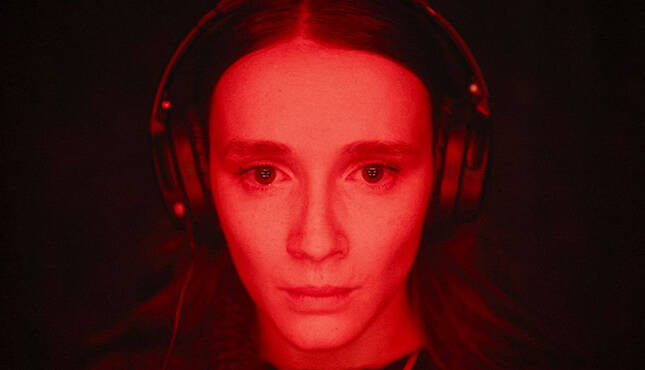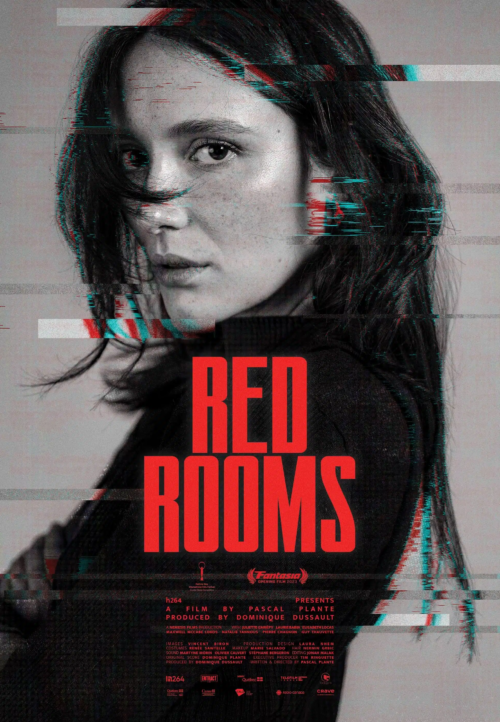Movies & TV / Reviews
Overlook 2024: Red Rooms Review
 Image Credit: Utopia Distribution
Image Credit: Utopia Distribution
Directed by: Pascal Plante
Written by: Pascal Plante
Starring:
Juliette Gariépy – Kelly-Anne
Laurie Babin – Clémentine
Elisabeth Locas – Francine Beaulieu
Natalie Tannous – Maître Chedid
Pierre Chagnon – Maître Fortin
Guy Thauvette – Juge Marcel Godbout
Maxwell McCabe Lokos – Ludovic Chevalier

Running Time: 118 minutes
Not Rated
As a society, we’ve taken on an obsession with true crime. Podcasts, streaming documentaries, serial killer movies – all of these speak to our endless appetite for stories about horrible deeds done to innocent people. When I say “we,” I’m not looking at this from the outside; I’m included in that as much as anyone and my Netflix, Hulu and Max watch history will attest to that.
There’s been a debate about the ethics of true crime in the past few years. How moral is it to consume cases of real people’s trauma, and what does it say about people who watch so voraciously? Red Rooms, the latest film from Pascal Plante, wades into those thorny questions. The psychological thriller, which screens at the Overlook Film Festival this weekend, examines our obsession with serial killers and dark acts with an unflinching look that refuses to provide any easy answers.
Red Rooms stars Juliette Gariépy as Kelly-Anne, a tech-savvy model living in Quebec. When we first meet Kelly-Anne, she is sleeping on the street. Not because she’s destitute; far from it. Rather, she wants to make sure she gets a good seat in court for the trial of Ludovic Chevalier. Dubbed “The Demon of Rosemont,” Chevalier is accused of murdering three teenage girls and filming their deaths for profit in one of the mythical livestreaming “red rooms” on the dark web.
While most are treating Chevalier’s guilt as a foregone conclusion, not everyone is so sure. Kelly-Anne’s opinions are more circumspect than most; when she meets an obsessed fan of Chevalier’s who is convinced of his innocence named Clementine (Laurie Babin), she points out several details in the prosecution’s favor. But she is no less obsessed with the case and strikes up a friendship of sorts with Clementine. As the trial continues on, she begins to go further and further down the rabbit hole, crossing several ethical boundaries in order to get to the truth – and track down the missing red room video for one of the victims, which could hold the key to exonerating or damning the accused.
Right from the start, it’s clear that Red Rooms isn’t just another serial killer movie. While Chevalier and his alleged murders are the core which the story revolves around, the film is not nearly interested in him or his crimes as our protagonist is. Chevalier, played with glassy-eyed neutrality from a glass cage by Maxwell McCabe Lokos, is more of a mirror held up to Kelly-Anne’s psyche. She is outwardly less serial killer-y than Chevalier, though her own motives are kept in doubt – a canny move by Plante to keep us wondering exactly what’s going on here.
Plante also avoids wallowing in the violence of the crimes; the potentially incriminating videos are played, but off camera and we only hear the horrifying acts, with a brief shot of a bloody room in the background at one point. It’s more important that we see how they affect others – notably Kelly-Anne and Clementine, who have drastically different reactions that serve to propel our understanding of the characters and what Plante is saying about what such an unhealthy obsession can do.
Gariépy is the unequivocal star here, and her performance as Kelly-Anne is revelatory. Faced with a character who hides a lot of herself from the outside and doesn’t verbalize a lot, Gariépy is relegated to nonverbal ways to convey the character, giving her enigmatic (and possibly sociopathic) character nuance and depth far beyond the surface.
Kelly-Anne’s layers become a mystery all her own, and the most interesting such element of the film. Why does a smart, tech-savvy woman who is clearly doing very well for herself get sucked into Chevalier’s case? It’s not an easily answered question, and maybe she Kelly-Anne herself doesn’t know, but Gariépy keeps us guessing even as Kelly-Anne’s obsession causes her professional and mental health to fall apart.
With a star performance to center his film around, Plante leans hard into stylistic flourishes to convey Kelly-Anne’s emotional state. His use color, ranging from a saturated blue in the opening scenes to the sterile lighting of the courtroom and a wash of red toward the end – speaks volumes. So to does Dominique Plante’s score, which particularly comes alive in one unhinged scene in the courtroom where Kelly-Anne unleashes a stunt that escalates her trajectory.
As much as Red Rooms is about the allure of true crime, the danger of conspiracy spirals and what it means to be seduced by the dark side of human nature, it’s also not interested in giving a pat solution. Much like Kelly-Anne’s online poker handle of the Lady of Shalott, Plante’s film looks at the shadows of the world through a mirror and finds what it sees wanting.
The Overlook Film Festival takes place in New Orleans from April 4th through the 7th.










